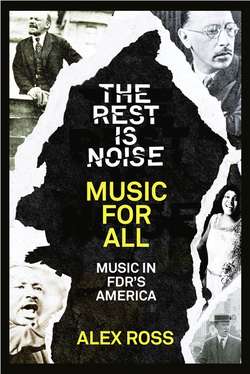The Rest Is Noise Series: Music for All: Music in FDR’s America

Реклама. ООО «ЛитРес», ИНН: 7719571260.
Оглавление
Alex Ross. The Rest Is Noise Series: Music for All: Music in FDR’s America
Отрывок из книги
This is a chapter from Alex Ross's groundbreaking history of 20th century classical music, The Rest is Noise.
It is released as a special stand-alone ebook to celebrate a year-long festival at the Southbank Centre, inspired by the book. The festival consists of a series of themed concerts. Read this chapter if you're attending concerts in the episode America: a new world discovers its voice.
.....
Copland heard stories of the West, but he spent his childhood in Brooklyn. His father ran a department store at the corner of Dean Street and Washington Avenue, and the family lived above it. Copland later described the neighborhood as “simply drab” and claimed that he had received no musical stimulus from it, although he could hardly have been unaffected by the diverse clamor of popular and classical airs that enlivened any Brooklyn or Manhattan block at the turn of the century.
Copland’s background was, as it happens, very similar to George Gershwin’s. Both were Brooklyn-born, a little over two years apart. Both were Russian-Jewish in origin. Both studied composition with a man named Rubin Goldmark. And they haunted the same locales in their youth; Gershwin attended recitals at Wanamaker’s department store, while Copland made his debut there in 1917. Copland noted some of the similarities in his memoirs, but said that no personal bond formed between them: “When we were finally face to face at some party, with the opportunity for conversation, we found nothing to say to each other!” Each may have envied the other’s advantages—Copland’s intellectual acclaim, Gershwin’s fame and wealth.
.....